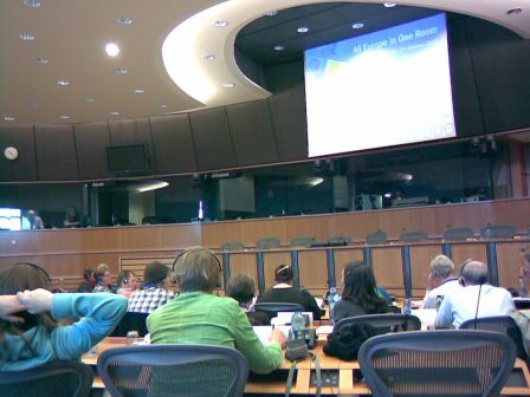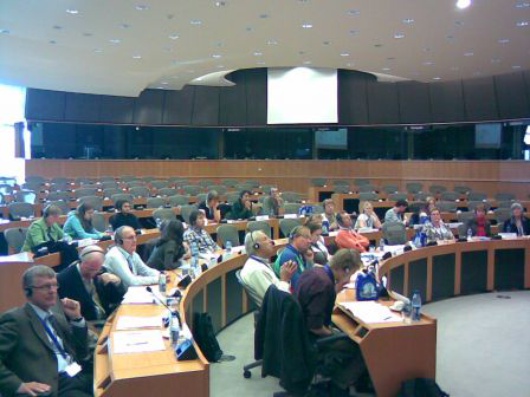362 Europeans in one room
Published on
By Federico Poggi in Brussels

From Friday the 12th to Sunday the 14th a Deliberative Poll® was organised in the European Parliament in Brussels. A representative sample of 362 people travelled to Brussels and was asked to express its view and concerns on major issues at European level. Results from the poll will be released in Lisbon Oct. 17, a day before the European key summit on the European Reform Treaty convenes.
Deliberative Polling ?
Deliberative Polling® is a trademark concept and process developed during the 1990s by Professor James Fishkin of Stanford University U.S.. It has been tested many times in different democracies (U.S., Italy, Bulgaria, U.K., Australia and others) but it has never reached this dimension and complexity. Tomorrows Europe and Notre Europe– main organisers of the poll – have managed to gather 362 people (out of 400 invitations) from 27 member states, speaking 21 different languages, to discuss issues related to jobs, employment and Europe’s role in the world. The goal of the event is to produce a poll listing a number of concerns of European citizen to be made public and considered by highest level EU policy makers. For Mr. Fishkin it was a real challenge to make all those people speak a common language.
The 362 people sample was chosen on the basis of their age, sex, nationality and of all walks of life. The sample discussed issues identified by the outcome of a previous poll on a wider sample (3500 EU citizens) about the key matters for the future of the EU. During the 3 polling days, the sample was divided in 18 small groups, each of them composed of a representation of 3 member States. At the end of discussions of each small group, a question summarising the outcome of the discussion was drafted and asked to a panel of experts. At the end of the process, the sample had to answer questions that were submitted before the poll again, for a survey that is currently being made on the basis of the questionnaire. To see whether the experiment actually delivered an aware opinion within the sample, we thus will have to wait for that survey to be carried out.
Unleashed in the European Parliament

Cafebabel.com Brussels has followed the event closely meeting both participants and organisers. Deliberative polling applied at European level turned out to be not only a valid political tool for participative democracy but also much more : it was also an exciting and interesting social experiment. In most small groups meetings some national clichés about cultural attitudes were often confirmed. Different approaches and concerns according to nationality were also to be witnessed in the questions asked by the small groups. For instance, when called on to discuss the international role to be played by the EU, groups where the French and southern countries in general where represented focused more on the EU as a promoter of peace, social and human rights. Where Nordic countries prevailed, the groups seemed more concerned about economics and the EU's boundaries in view of further enlargements.
How did they get there ?
A typical example : Sandra (19), a Swedish student, like all the others, was contacted by phone and was asked if she had time to answer some questions. It took 20-30 minutes to answer to the first questionnaire following which she was invited to travel to Brussels and participate to the poll. She found the proposal interesting and accepted right away. We asked Sandra what she thought was the main problem of the EU: she thinks that “the EU should have a stronger role to play in the world. Europe should improve its relationship with the U.S., learn to speak up and to speak with one voice but unfortunately member states are unlikely to move towards this direction”. Sandra was part of the sample just as Marco (24), a French part-time ambulance driver, according to whom religion should have more space in EU-related discussions.
On the expert side...
The experts called to answer the questions of each small group were divided in three panels - one per day. Panellists were professors, heads of important European think tanks, members of the EESC, members of the European Parliament and prominent political personalities such as Mr. Tommaso Padoa-Schioppa (Italian Minister of economy) and Mr. Serguei Stanishev (Bulgarian Prime Minister). In the plenary, each time a question was answered by the panellists, participants were asked whether the answer was exhaustive enough, but of course, due to the wideness of the issues treated, there was never enough time to really go into detailed explanations. For the real outcome - that is, the answer to the question "did this survey make you change your mind about Europe?" - we now will have to wait until Wednesday the 17th October.
The range of issues discussed was indeed very broad. In the “Europe’s role in the world” discussion, we listened questions on international terrorism, EU environmental and energy policy and security of energy supply, Darfour, enlargement, the boundaries of Europe, Turkey, the genocide of Armenians and many others. Moreover, panellists were often politicians with opposite visions and this fact has probably not helped much the participants in search for clarity.
Solving the democratic deficit : mission possible !
That said, the organisation of the event was a success. The sample was a true EU microcosm even though the organisers admitted that participants were in average ..."a bit too cultivated". What matters, though, is that at the end of the day, 362 people have got in touch with European matters, which, according to the great majority of them, are too often overlooked by national media. Another token that the democratic deficit of the EU would be significantly smaller if citizens were more informed on a European dimension.
By Federico Poggi
Update: the results of the poll can now be checked here



